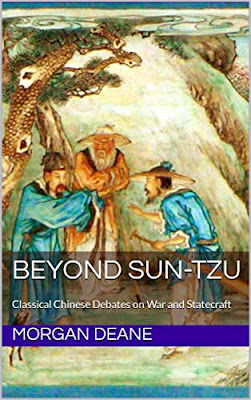This is a rough draft of a Wikipedia article that I am writing for F.A.I.R. Feel free to provide any feedback that you have.
Strategy in the Book of Mormon:
Merriam Webster’s dictionary defines strategy as “the science and art of military command exercised to meet the enemy in combat under advantageous conditions".[1]
The Nephites adopted a strategy that most closely resembles what military historian Russell F. Weigley labeled the “offensive defensive”.[2] They were commanded to avoid offensive wars, (Mormon 3: 9-15)and multiple leaders such as Mormon and Limhi specifically refused to lead the Nephites in their offensive operations outside of Nephite lands (Mosiah: 21:6-12). They believed that their temporal safety and strength in war making were ensured through righteous living and pre battle ritual (Alma 61:13, Alma 46: 9-28, Alma 48: 7, Helaman 4: 24-26). However, once Nephite lands were attacked they were commanded by the Lord to “resist evil…with [their] swords” (Alma 61:10-13), and they felt it was “no sin” to use stratagems and offensive operations to defeat enemy armies (Alma 43: 30).
As part of this defensive mindset the Nephites built towers (Helaman 7:11), walls and small forts (Alma 48:8).[3] Under the reign of Pahoran, Moroni evicted Lamanites settlers along both the east and west seas so he could establish what anthropologist John Sorenson called “military outposts”.[4] These settlements strengthened the Nephite position (Alma 50:10-13). One researcher suggests this strength derived from the placement of the city Moroni upon a pivotal river crossing.[5] Further research postulates the existence of military colonies established closer to the west sea to bolster the defense of that area.[6]
Upon the invasion of Nephite lands military leaders relied upon defensive fortifications in many cases (Alma 49). However in later Nephite history this often proved ineffective (Helaman 1). Historians A. Brent Merrill and Morgan T. Deane suggest that Moroni used what is now called the
principles of war in seeking to attack and defeat enemy armies.[7] Additionally the Nephites used “complex pre battle maneuvering”,[8] pre battle divination (Alma 43:23), ambushes (Alma 43:31-33), spies (Alma 50:31), and feigned retreats (Alma 52:23, 56:36), that culminated in shock battle (Alma 43:37, Alma 52: 32-34). (see TACTICS for more) And sometimes the various parties requested battle at a specific time and place ( Mormon 6: 2, Alma 52:20).[9] Although several pre battle ruses such as raids upon enemy supply,[10] aiding internal dissension (Alma 61: 8), and obstructing marching armies[11] suggest that some strategic options were designed to weaken armies through means other than battle.
For sub national actors such as the Gadianton Robbers, the Nephites adopted a military strategy of “search and destroy” (Helaman 11:28). This policy often failed miserably due to difficult terrain that these robbers occupied. When operating outside of that difficult terrain the Nephites consolidated their position to their central cities. They tried to defend those cities and engage the enemy army in climatic shock battles that took advantage of additional ruses, such sending an army to cut off their retreat (3 Nephi: 2:11, chapters 3-4).
Footnotes:
1. http://www.merriam-webster.com/dictionary/strategy (Accessed August 19, 2009).
2. Russell Weigley The American Way of War Indianapolis IN: Indiana University Press, 1973, 96-97.
3. See FORTIFICATIONS.
4. John Sorenson. Mormons Map.(still need to complete this footnote)
5. Preliminary research posted on http://mormonwar.blogspot.com/2009/04/naval-warfare-in-book-of-mormon.html (Accessed August 19th 2009).
6. Unpublished research: “Notes on a Curious Verse: Alma 56:28” by Morgan T. Deane.
7. A Brent Merrill “Nephite Captains and Chief Captains in the Book of Mormon” in Stephen Ricks and William Hamblin Ed. Warfare in the Book of Mormon Provo, Salt Lake City: Foundation for Ancient Research and Mormon Studies and Deseret Book, 1991. Morgan Deane “No Sin by Stratagem” BCC E Journal 4:1 (2009), 1-32. (Forthcoming) “Principles of War” should have a hyper link to its Wikipedia article.
8. William Hamblin “The Importance of Warfare in Book of Mormon Studies” in Noel B. Reynolds Ed. Book of Mormon Authorship Revisited Provo, F.A.R.M.S. Publication 1997.
9. John Welch also argues that the Almicite War recorded in Alma 1-2 was prearranged: John Welch “Why Study War in the Book of Mormon” in Stephen Ricks and William Hamblin Ed. Warfare in the Book of Mormon Provo: F.A.R.M.S. Publication, 1991.
10. Brant Garnder’s Multi Dimensional Commentary of the Book of Mormon for Alma 52:22.
11. Morgan Deane Preliminary Research posted on http://mormonwar.blogspot.com/2009/02/army-composition-and-tactics-part-ii.html (Accessed August 19, 2009).






